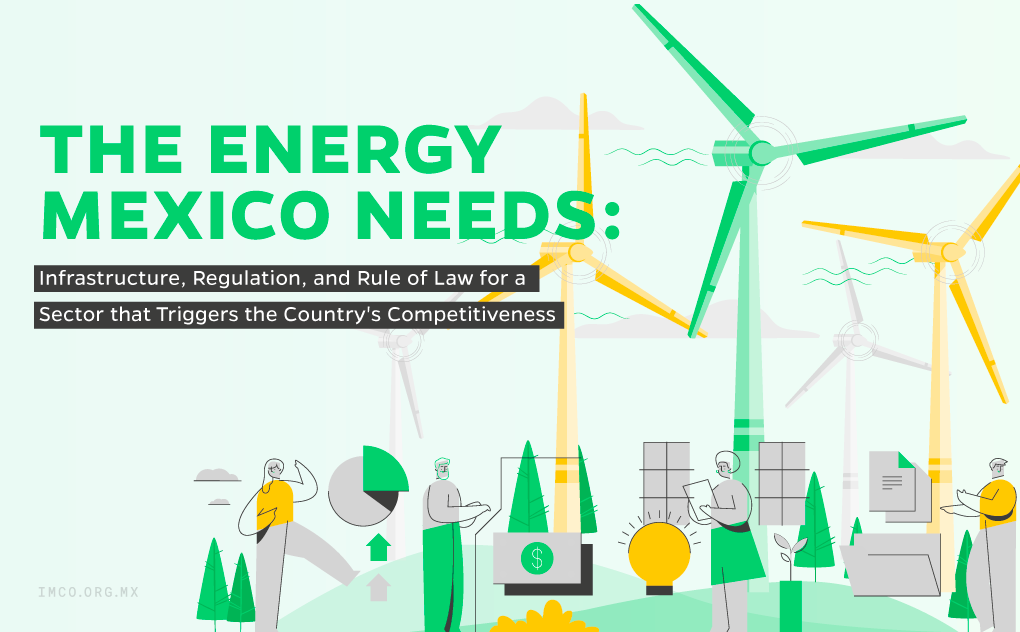 Mexico needs public policies that promote a more reliable energy sector with low emissions and competitive prices
Mexico needs public policies that promote a more reliable energy sector with low emissions and competitive prices
The energy policies promoted by the federal government since 2018 have not been aligned with global trends focused on decarbonizing economic activities, where lower emission energies play an increasingly important role. Rather, they’ve generated conflicts and roadblocks for much-needed investments which are needed to guarantee a reliable, clean, and affordable energy supply, one that is accessible for both citizens and consumers.
Economic growth and development opportunities depend on an energy sector with competition and public and private investment. Therefore, it is essential for the country to have regulated energy markets, successful and productive State companies, and healthy public finances that promote economic competitiveness.
The energy Mexico needs
Mexico must aspire to have an energy sector that guarantees three essential characteristics: reliable supply -with uninterrupted and safe access for consumers-, lower emissions, and competitive prices. That is why the Mexican Institute for Competitiveness (IMCO) is releasing The energy Mexico needs, a comprehensive study that seeks to offer viable proposals for the country to successfully transition from an energy sector anchored in hydrocarbons to one that strengthens competitive energy markets that generate employment, accelerates the energy transition, attracts high value-added industries, and benefits Mexican consumers.
Today, the country is going in the opposite direction of a global transition that is gradually moving towards the decarbonization of economic activities. Reversing this course is urgent, and imperative in order to increase the competitiveness of Mexico. IMCO makes proposals for 3 key sectors: oil, gas, and electricity.
Oil. Mexico is no longer a petrolized economy. However, approximately 19% of the federal government’s revenue still depends on oil resources. It is necessary to promote a more efficient process for exploring and developing fields, considering international market conditions, as well as seeking competitive finance opportunities that do not impact public finances. Additionally, the country must prepare for structural changes in petroleum markets and industrial processes of crude oil transformation, with more infrastructure for storage and transportation. In order to achieve these goals, the country must harness the advantages that foreign trade offers for the minimization of all possible costs. In the process, it should be kept in mind that the needs of the Mexican market and Pemex’s refining business are not, nor should they be, the same.
Challenges: Maximizing the value of this asset from a perspective of intergenerational equity. Meaning, the country needs to ensure that the income from the exploitation of a non-renewable resource, such as oil, benefits generations that will remain once it is exhausted, not just present generations.
IMCO Proposes:
- Resume and improve the frequency of hydrocarbon bid rounds.
- Promote farm-outs between Pemex and private operators.
- Redesign the operation of the Mexican Petroleum Fund in order to finance the energy transition.
- Develop a strategy for refineries to process higher value-added products and to reconfigure facilities for petrochemicals.
- Facilitate the granting of fuel import permits.
Gas. The country must take advantage of natural gas as a transition fuel. In the same way, it is necessary to promote competition in the liquefied petroleum gas (LPG) market to incentivize a better, more affordable, service for Mexican households without having a negative impact on public finances.
Challenges: The demand for natural gas in Mexico has registered a sustained growth that has not been accompanied by an increase in transportation and storage infrastructure. The country is limited in its ability to respond to abrupt changes in supply or demand.
IMCO Proposes:
- Promote the production of natural gas from hydrocarbon rounds.
- Develop storage infrastructure for natural gas.
- Develop transportation infrastructure for natural gas.
- Follow the rules and regulations for the granting of LPG import and distribution permits to the private sector.
- Design a strategy to minimize methane emissions into the atmosphere.
Electricity. The country must aim to generate a greater share of its electricity from a diversified matrix that supports the mitigation of climate change and provides safe and affordable energy to consumers. This can be achieved through efficient transmission and distribution networks deployed nationally in a way that respects the rights of communities and minimizes environmental impact.
Challenges: Given the predicted increase in electricity demand, the country risks a deficit in generation capacities due to a failure to resume public and private investments in the sector. In the same sense, it is necessary to reinforce the current transmission infrastructure so that it’s able to grow at the same rate as the electricity demand, paving the way for public and private power plants to begin operations in the following years and meet demand.
IMCO Proposes:
- Comply with the norms and regulations for the granting of new electricity generation permits.
- Reactivate long-term auctions.
- Return to Clean Energy Certificates (Certificados de Energía Limpia or CELs) as instruments to expand the country’s renewable capacity.
- Publish regulations for collective distributed generation in the Official Gazette of the Federation (DOF).
- Fully exercise the resources approved for investment in power electric transmission and distribution infrastructure.
- Release additional resources for CFE Transmission and CFE Distribution.
- Prioritize investments in business areas where CFE generates profits.
- Comply with the obligations regarding investment in transmission and distribution infrastructure.
- Take advantage of available investment financing mechanisms and facilitate the participation of the private sector in investment in transmission infrastructure.
The success of the measures presented in this study is based on an unrestricted and credible commitment of the Mexican State to the rule of law which promotes an adequate investment climate that triggers the development of critical infrastructure for the energy sector.
Mexico needs competitive energy markets that enable higher growth rates, allow the gradual decarbonization of the economy, strengthen Mexico’s energy security, and, ultimately, promote better living standards for all Mexicans.
